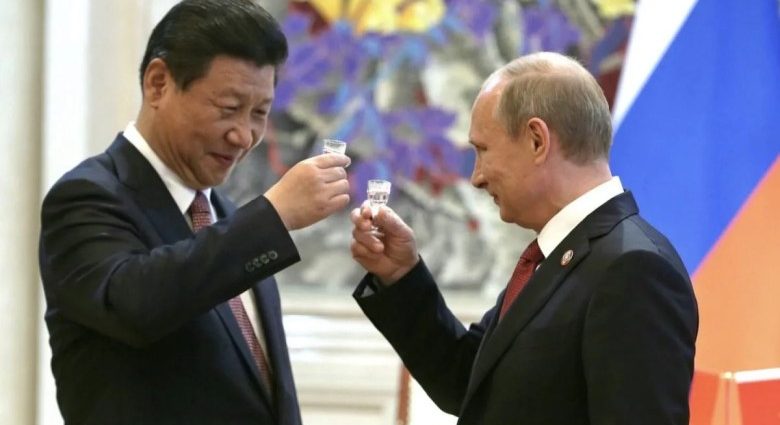As Russia faces Western sanctions, China seeks to deepen Sino-Russian economic ties
by boosting trade and switching to deal-settlement in their own currencies.
Chinese media columnists say Russia and China have already strengthened
their relations – by giving a green light to a natural gas project called the Far Eastern
route. They add that China would also sell more autos to Russia.
On January 31, the Chinese and Russian governments signed an agreement to start
construction of the Far Eastern route, which will transport 10 billion cubic meters of
natural gas from Russia to China annually.
The gas supply contract was signed by China National Petroleum Corp (CNPC) and
Russia’s Gazprom in February last year. It will be settled in renminbi and rubles.
Last year, China obtained 15.5 billion cubic meters of Russia’s gas via the Power of
Siberia route, almost half again the 10.4 billion cubic meters it received in 2021. Import
volume via that route is expected to reach 38 billion cubic meters by 2025.
With the Far Eastern route, Russia’s total gas exports to China will grow to 48 billion
cubic meters annually. The total volume is expected to increase further by 50 billion
cubic meters after the Power of Siberia 2 route commences operation in 2030.
Russian Deputy Prime Minister Alexander Novak said on February 13 that Gazprom
would accelerate the construction of the Far Eastern route and Power of Siberia 2.
Russian news agency Sputnik reported last month that China had shipped 31,000
trucks to Russia in 2022, up 300% from 7,700 units the previous year.

Sputnik said the shipment of Chinese public transport vehicles to Russia grew 69% to
2,000 units while that of special-purpose vehicles such as fire trucks, ambulances and
cranes tripled to 3,000 units last year. Russia’s import of Chinese tractors was
unchanged at about 89,000 units.
Overall, bilateral trade between Russia and China surged 29% to US$190.3 billion in
2022 – a year in which Russia was making enemies elsewhere in the world with its war
of conquest in Ukraine.
Russian President Vladimir Putin was still thumbing his nose at his chief foe on Tuesday
when he said he would suspend Moscow’s participation in the Strategic Arms Reduction
Treaty, or START, the last remaining nuclear arms control treaty agreed upon by the
Soviet Union and the United States. Signed in 1991, the treaty was aimed at reducing
strategic offensive arms on both sides.
While Putin’s decision was seen by commentators as the start of a new Cold War, the Wall Street Journal reported that Chinese President Xi Jinping planned to visit Moscow
for a summit with Putin in April or in early May. The news came after the Chinese
foreign ministry said Monday that Xi would release a proposal document on Friday
seeking political settlement of the Ukraine crisis.
On Tuesday, China’s top diplomat Wang Yi held a meeting with Russian Security
Council Secretary Nikolai Patrushev in Moscow. Both Russia and China expressed their
willingness to jointly practice genuine multilateralism, oppose all forms of unilateral
bullying, and promote the democratization of international relations and the multi-
polarization of the world, the Chinese foreign ministry said in a statement on
Wednesday.
Both sides agreed to continue to strengthen cooperation within the multilateral
framework, make more efforts to improve global governance, ensure peace and stability
in the Asia-Pacific region and oppose the Cold War mentality and ideological
confrontation, it said.
Patrushev was quoted by Russian news agency TASS as saying that the further
deepening of strategic partnership between Russia and China, which were both
subjected to containment by the West, was of particular importance.

He said the West wanted to deter Russia and China as part of its attempts to preserve
global domination. “The bloody events in Ukraine staged by the West is just one
example of it,” he said. “All that is being done against Russia and China and to the
detriment of developing nations.”
He reiterated Russia’s unwavering support for Beijing on the issues of Taiwan, Xinjiang,
Tibet and Hong Kong.
Wang said China’s relations with Russia were solid as rock and would stand the trials of
the changing international situation. He said China sought to “promote mutually
beneficial cooperation in all areas” as the two nations defend national interests.
Wang and Patrushev also exchanged views on the Ukraine issue.
Read: Power of Siberia 2 to divert Europe-bound gas to China
Read: Amid heated rhetoric, China proposes Ukraine summit
Follow Jeff Pao on Twitter at @jeffpao3

